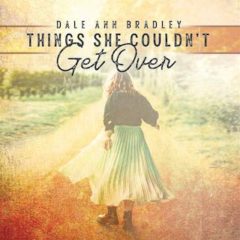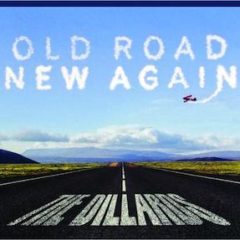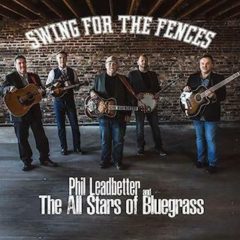
Dale Ann Bradley: Pulling no punches in probing contemporary, hot-button issues
 THINGS SHE COULDN’T GET OVER
THINGS SHE COULDN’T GET OVER
Dale Ann Bradley
Pinecastle
Returning to solo work after an interesting detour into Sister Sadie, Dale Ann Bradley pulls no punches in probing contemporary issues of the hot-button variety. Among these you could say she definitely chose the right tune to serve as the album’s title track: driven by a silky blend of Mike Sumner’s steady banjo work, Jim Hurst’s understated guitar and Matt Leadbetter’s nuanced, tear-stained resophonic punctuations, the Bradley-penned “Things She Couldn’t Get Over” speaks of a woman suffering with a head full of bad wiring (the source of which is not quite clear, although it seems to suggest it’s an organic ailment that resisted treatment) who struggled to find higher emotional ground, only to find the beast attacking again. Finally, she succumbed to its destructive ways. There’s a tension between the pastoral background the instruments summon and the measured, reportorial tone Bradley strikes in her vocal. Singing about a friend (the song is based on someone Bradley once knew), it’s as if the narrator is struggling to contain her own grief as the story plays out, leaving the key lyrics to haunt a listener’s memory in their vividness, such as “there were times she came so close to being free/I’ve seen her close her eyes, look towards the sky/the pain from the past seemed to be/too deep for her not to wonder why…” and “her mind was like a hi-fi stereo/with no way to turn the volume down…”

‘Things She Couldn’t Get Over,’ written by Dale Ann Bradley for her like-titled new album

‘Lynwood,’ written by Vietnam Veteran David. Morris, as featured on Dale Ann Bradley’s Things She Couldn’t Get Over
That these songs are so strikingly presented is testament to the uniformly penetrating lyrics and high-caliber musicianship alike, from Ms. Bradley’s earthy vocalizing to the sensitive support from her road band and guests on the order of brilliant fiddler Michael Cleveland, among others. Bradley’s album opening co-write with Aaron Bibelhauser, “Living on The Edge,” finds Cleveland’s fiddle and Mike Sumner’s banjo setting a blistering pace as Bradley forcefully articulates a jut-jawed response to being bullied (“when you push me to the ledge it’s easy to see/you think nothing’s wrong with you…”). The driving, fiercely rendered “Yellow Creek,” featuring an especially evocative mandolin solo courtesy Ashby Frank tp complement Cleveland’s swoops of searing fiddle, “Yellow Creek” finds Bradley digging with unalloyed intensity into the tragedy of the Cherokees displaced and forced to their destruction on the Trail of Tears. “Lynwood,” Vietnam Vet David Morris’s poignant ballad, enhanced here by Cleveland’s soulful fiddling and Frank’s tender mandolin, reminds us of too many soldiers’ sacrifices being forgotten upon their return to the world. In addition to standing out on mandolin, Frank contributes an original song, “Falling Down,” a portentous sounding bluegrass ballad in which Bradley assumes the identity of a woman admitting to embracing a completely internal life instead of risking her heart on anyone or anything; with a slight tremble in her voice, she confesses, “I wish I could write a song, but I don’t know the words/I wish I could show my heart, but I’d probably just get hurt/you know me, I’m getting’ by/feet are steady on the ground/how’m I ever going to fly/when I’m scared of falling down.” The careful listener will note how she perks up slightly trying to bring you into her confidence with that “you know me” line, but it’s all façade in a remarkable characterization by the singer nonpareil. So many narratives here boil down to things she couldn’t get over, until, at album’s end, she advises:“In the end there’s no rewind.” Perhaps we best listen up, and listen long, to a towering artist’s cri de coeur. –David McGee
***
 OLD ROAD NEW AGAIN
OLD ROAD NEW AGAIN
The Dillards
Pinecastle
It was 1968 when the original Dillards lineup released Wheatstraw Suite, an album built on traditional bluegrass musical values coupled to adventurous instrumentation (a full orchestra, for one) and sonics typically associated with other genres, including rock ‘n’ roll. By then the Dillards had already been around a while and had seen their fan base broaden as a result of several rousing appearances (as The Darlings) on The Andy Griffith Show over the years. Being Mayberry’s “house band” was a great career move, but for their part the band simply stayed on an ever-progressive, ever more influential path as the years rolled on and the lineup changed periodically (beginning in ’68 when founding member Doug Dillard dropped out to form Dillard and Clark). But the Wheatstraw Suite album, among the many outstanding Dillard long players, came to be regarded as a masterpiece and a whole universe of then-young musicians who were deeply influenced by it have sung its praises. Elton John would be one, and now comes an impassioned endorsement of its impact by John McEuen, who was a 17-year-old musician coming of age in Southern California when he was introduced to the band’s music when the Dillards played a club in his area.
“Rodney Dillard’s voice stood out then,” McEuen says, “and the songs rang true to my young ears, ears in searh of music that would take me away—it did. With originals and/or traditional songs (his arrangements), I learned my craft through his music. The albums with The Dillards were perfect in execution and got me hooked. Without his influence on my young notes and attitude, there would not have been a Nitty Gritty Dirt Band, nor a Will the Circle Be Unbroken album (our 6th record, which was placed in the Grammy Hall of Fame and the Library of Congress).”
McEuen’s words come from his liner notes for the new Dillards album, Old Road New Again. Rodney Dillard views the album as a bookend to Wheatstraw Suite and the title certainly is a perfect summation of the Dillards’ oeuvre if box sets were still in style. Today, only Rodney remains of the original quartet, but the current ensemble has been fairly stable since 2015, with Rodney accompanied by his wife Beverly Cotton-Dillard (clawhammer banjo, vocals), Gary Smith (acoustic and bowed bass), George Gidden (fiddle), Tony Wray (banjo, lead and rhythm guitars). This new long player also features a number of top-drawer guest artists, including former Dillards member Herb Pederson (harmony vocals), Ricky Skaggs (duet and harmony vocals), Bernie Leadon (banjo), Andy Leftwich (fiddle) among other all-stars. But this is, first and foremost, a Dillards album. And like their Pinecastle labelmate Dale Ann Bradley, Doug and company are addressing the real world in their mix of songs, original and from notable outside sources.

‘Earthman,’ The Dillards, from Old Road New Again

‘Save The Last Dance For Me,’ The Dillards, from Old Road New Again
Here the Dillards sing of renewal and reinvention. Declaring “the old road is new again,” Doug and the band proceed to prove it, in spades. These seasoned players deliver exceptional musicianship but also context in celebrating simple existential triumphs—such as putting one foot in front of another in an ongoing search “for a bit of love and truth” (the evocative, banjo-fueled opener, “Earthman”), taking “each day as it comes/living them one by one…ain’t that what’s it all about” (“Common Man,” a lilting, folk-flavored rumination, embellished soulfully with a sweet fiddle line) and chronicling an abiding feeling of despair and alienation running throughout America’s history in the furious charge of “Take Me Along For The Ride” (a master class of fleet fiddling courtesy George Giddens). In light of the events of January 6, the sentiments of “Tearing Our Liberty Down” are reason enough to fast forward to the next track.
In the album’s most surprising choice, investing Doc Pomus’s “Save the Last Dance for Me” with a souped-up rhythmic attack, soaring harmonies and a lively thrust–credit the thumping acoustic bass, keening fiddle and sprightly banjo–evoke swaggering assurance where others have plumbed the melancholy underpinning the title’s aspirational appeals. Much as The Grascals were too smart to take on Elvis in their bluegrass version of “Viva Las Vegas” back in 2004 (which featured Dolly Parton, who was herself on a most scintillating bluegrass trajectory at the time), Rodney Dillard finds his band’s own place in the Drifters’ classic without competing with Ben E. King.
Familiar in its musicality and stirring in its engagement with the real world, Old Road New Again finds a positively revitalized Dillards true to the new album’s title and thus to this hallowed group’s abiding aesthetic. –-David McGee
***
 SWING FOR THE FENCES
SWING FOR THE FENCES
Phil Leadbetter and The All Stars of Bluegrass
Pinecastle (2020 release)
Imagine the pandemic as the least worrisome backdrop for an album project. Consider bluegrass veteran Phil Leadbetter beating cancer five times, from the point of being diagnosed with Stage III Hodgkin’s Lymphoma in February 2011 through a procession of stem cell transplants, PET scans, chemotherapy of various types including clinical trials, remissions, recurrences, kidney failure, dialysis, a corneal transplant that failed due to the effects of the cancer drugs, pneumonia, E-coli, sepsis, shingles—that’s an abridged version of what Leadbetter has been experiencing going on 10 years now. He documents every stage of his journey on his website, in Phil’s Cancer Story and Cancer Updates. Then last year, shortly after the album was completed, pancreatic cancer claimed Leadbetter’s bandmate and best friend (of 45 years) Steve Gulley, one of the great bluegrass songwriters of our time. Gulley passed on August 18, 2020, shortly after he and his wife Debbie had recorded their last song together, “Yesterday’s Gone,” for what became Swing For The Fences.

‘Yesterday’s Gone,’ Phil Leadbetter and The All Stars of Bluegrass, A tribute to the late Steve Gulley, who duets with his wife Debbie on the track featured on Swing For The Fences. It was the couple’s last recording together.
This is largely the work of Leadbetter and his band—Leadbetter on reso guitar, Gulley on bass, Alan Bibey on mandolin, Jason Burleson on banjo, Robert Hale on guitar. Apart from Debbie Gulley, the sole guests are a trio of, well, all-stars themselves in vocalist Steve Wariner and fiddlers in Stuart Duncan (on two cuts) and Tim Crouch (on five cuts, including “Yesterday’s Gone”). It’s hard, if not impossible, to listen to the songs here outside the context of the personal and the pandemic issues in which it arrived. So the sprightly album opener, “No End to This Road,” all rich harmonies and precision picking with Gulley’s steady thumping bass providing ballast, cuts multiple ways with striking thoughts such as “This love is a journey to who knows where/we’ll get a little closer with every mile that we share/whatever our destination, let our hearts take a stand/’cause there ain’t no end to this road, no matter what direction we go/as long as we’re together, it goes on forever…” Time, the passing or the dwindling of it, hangs over the proceedings here—how could it not? In “Times Are Tough,” a reflective, midtempo bluegrass slice of life co-written by Ronnie Bowman and emotionally enhanced by Tim Crouch’s sensitive fiddling and Bibey’s succinct mandolin atmospherics, a man whose wife is clearly ailing acknowledges the title sentiment before adding, “but we’ve got love/that’s the one thing we started with and that’s enough/when times are hard, it’s easy to cry/but I’m just trying to laugh with the ones I love/while there’s still time.” Wariner joins the fray with his own poignant ballad, “I Wanna Go Back,” keyed by his tender vocal reflecting on the roots of his raising until he rises to a keening cry with “But it’s all over, it’s all behind us now/I would go back in a heartbeat if I only could somehow/but I wanna go back to the place where love was everywhere…they say you can’t go back home once you’re out on your own/but I wanna go back…” With empathetic commentary added by Leadbetter’s reso, Bibey’s mandolin and Burleson’s banjo, Wariner’s heartfelt sentiments become nigh on to tear inducing in one of his most beautiful latter-day performances. Speaking of tear inducing, the Gulleys hit the mark dead center on “Yesterday’s Gone,” which is not the Chad & Jeremy hit of yore but rather a searing country heartbreaker dissecting love gone awry, with Debbie’s mountain cry adding the je ne sais quoi to Steve’s measured, tender mea culpa, as twin fiddles ascend, in what would be the album’s marquee performance even without the tragedy attending it.

‘One Way Rider,’ written by Rodney Crowell, from Swing For The Fences, Phil Leadbetter and The All Stars of Bluegrass

‘Times Are Tough,’ Phil Leadbetter and The All Stars of Bluegrass, from Swing For The Fences
Lest readers think Swing For The Fences is a bit too dark, be advised that even the above-mentioned songs, save for the Gulleys’ duet, champion perseverance and companionship as critical to pulling through all kinds of challenges. And then there are moments such as the Bob McDill-penned “I’m Gonna Make It After All,” a jaunty retort to all and anything attempting to impede happiness, propelled instrumentally by feisty soloing—banjo, mandolin, reso, fiddle (Crouch again)—serving to emphasize the triumphant lyrical sentiment, “I’ve grown so used to thinking love would never come along/I found you, girl/I believe girl, I’m gonna make it after all.” And how do you argue and resist the jubilant workout on Rodney Crowell’s “One Way Rider,” with its lyrics shouting unwavering support of someone through all the obstacles life its ownself presents as Bibey, Burleson,, Duncan, Hale and Leadbetter each take a spotlight turn with red-hot solos to complement Gulley’s intense vocal. In the end, for its timeliness, for its frank confessions, for Phil Leadbetter’s undaunted spirit and fierce will to live, Swing For The Fences makes contact and sends a glorious sound soaring into the wild blue yonder, yet to alight. –-David McGee


